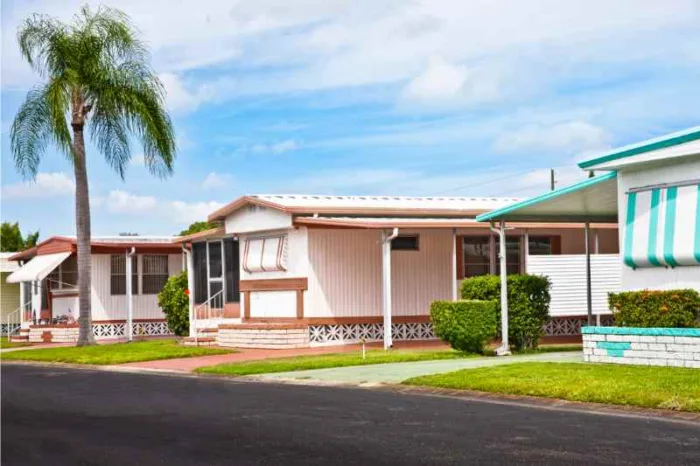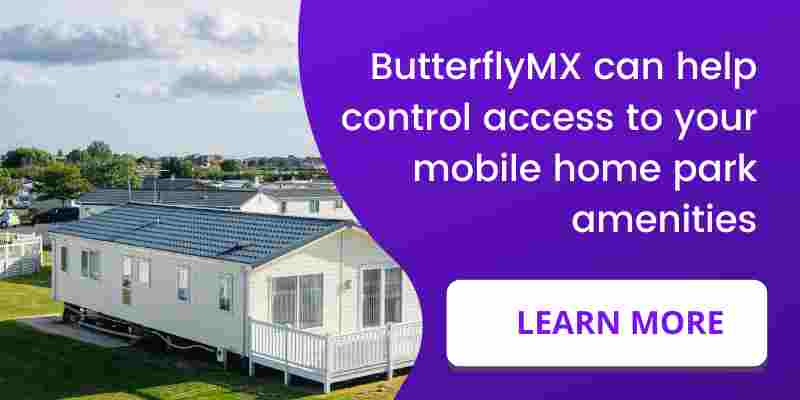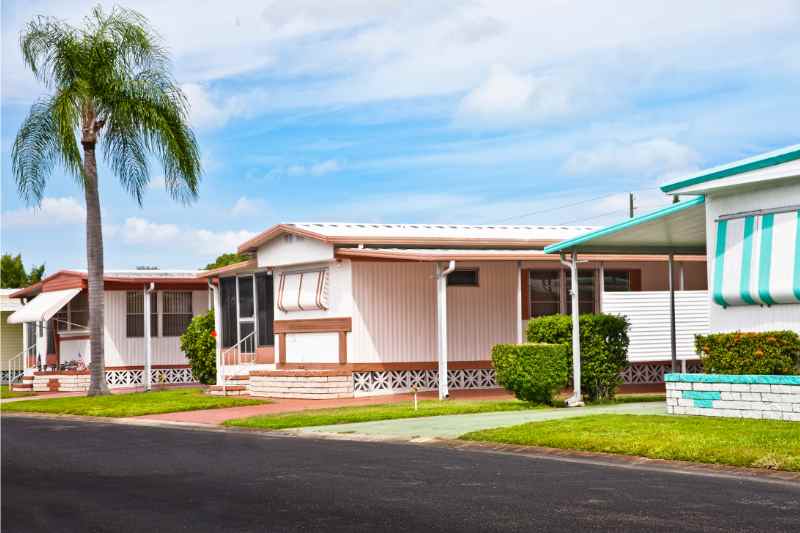
Disclaimer: This content is for informational purposes only, you should not construe any such information as legal, tax, investment, financial, or other advice. Nothing contained on our site constitutes a solicitation, recommendation, endorsement, or offer by ButterflyMX or any third-party service provider. ButterflyMX is not a financial adviser. You should always seek independent legal, financial, taxation, or other advice from a licensed professional.
Mobile home park investing is a viable real estate investment alternative that doesn’t involve multifamily or commercial properties. However, it does have unique hurdles and requirements that you should consider carefully.
First, this guide will define what a mobile home park investment is and how it makes money. Next, we’ll review the benefits of mobile home parks. Finally, we’ll review the few cons of mobile home park investing.
This post covers:
- What is mobile home park investing?
- 5 reasons to invest in a mobile home park
- How do mobile home parks make money?
- Cons of owning a mobile home park
What is mobile home park investing?
Mobile home park investing involves either purchasing an existing mobile home park (also known as a trailer park) or developing a new mobile home park, then renting out the lots within the park for a monthly fee.
Note: You can invest in tiny homes; however, most people own their own trailers within a mobile home park. As the property owner, you would likely just own the lots within the park, as well as electrical, sewage, and water hookups.
5 reasons to invest in a mobile home park
Mobile home parks may be a great investment opportunity for both established and first-time investors.
Potential benefits of making a mobile home park investment are:
- Many residents own their own trailers
- High demand
- Tax opportunities
- Low maintenance
- Long-term tenants
1. Many residents own their own trailers
Because residents often own their trailers, purchasing a mobile home park is significantly cheaper than buying an investment property such as a commercial building financing. Essentially, you’re just purchasing land that has been permitted to host mobile homes. So, you don’t have to worry about inspecting individual trailers and renovating them.
Instead, your only concern will be ensuring the land is stable and has an appropriate amount of curb appeal to draw in renters.
2. High demand
Over 10 million people rent mobile homes in the USA. Furthermore, there are many more people seeking the low-cost housing benefits of a mobile home than there are available mobile home parks.
This high demand means that you can charge higher rent for available lots. It also means that you can fill vacant lots/units more quickly than you would with other rental properties.
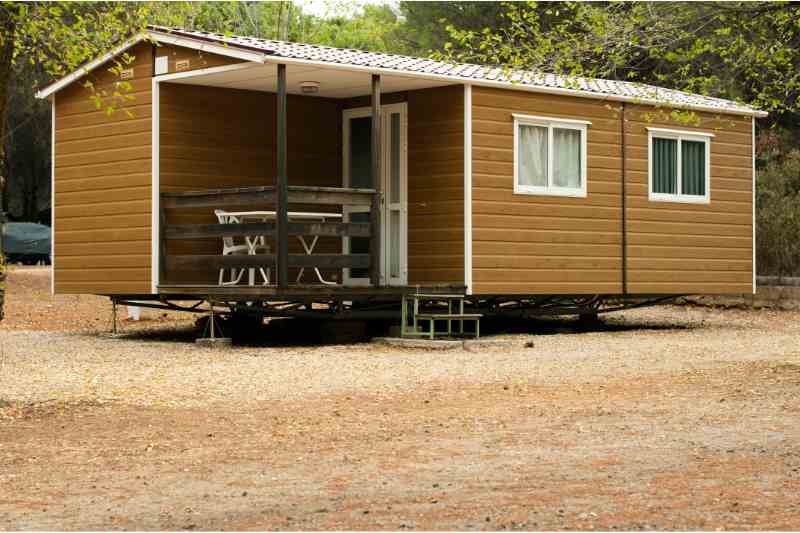
3. Tax opportunities
One of the biggest tax benefits of mobile home park investing is how quickly the property depreciates. Depreciation occurs due to the amount of land improvements that can be written off every year.
This includes the maintenance of roads and sidewalks within the park as well as the many hookups available to each mobile home. All of those things are assumed by the government to get worse with time and become more costly to maintain, hence the depreciation of your property.
By claiming property depreciation on your taxes, you save a ton of money during your early years of ownership. This money can then be put toward fixing up the park or future investments.
4. Low maintenance
Because you’re likely not responsible for individual units, the only maintenance you have to worry about concerns the land within the park itself. You don’t have to worry about clogged toilets, broken lighting fixtures, or heating issues that plague rental units in traditional multifamily apartments.
Essentially, a groundskeeper is the only possible contractor you’ll have to hire to maintain your property. And that’s only if it’s too big of a task to handle yourself
5. Long-term tenants
Mobile home park tenants enjoy the benefits of owning their units at a low monthly cost without having to take care of the land they live on. Many mobile home park tenants are satisfied with their low-expense lifestyle and will likely stay for the long term. Some reports list that as many as 90% of tenants stay in one place for the majority of their lives.
One additional reason tenants tend to stay put at a mobile home park is financial strain. It can cost upwards of $5,000 in expenses to move their mobile home to a different location. Many residents won’t bother, especially if you keep your rental increases fair.
How do mobile home parks make money?
A trailer park owner’s salary or ROI (return on investment) depends on how much rental income they receive in a given year. They only make a profit if they get more in rental income than they spend on expenses for maintenance, taxes, and loan payments.
In addition to rental income, investors can make money in a mobile home park investment via:
- Hookup fees for electricity, water, and sewage
- Parking fees
- On-site laundry
- On-site convenience store
Learn how to invest in multifamily real estate:
How much can a mobile home park raise rent?
In many states, there’s no limit to how much you can raise rent at a mobile home park. In other states, like New York, rental increases cannot exceed 6%. For the most part, the exact amount depends on the landlord.
For example, some landlords follow the philosophy of only increasing rent after renovations or when property taxes go up in a local region. Conversely, other landlords keep their rent at a set price if they have good tenants.
Additionally, if you invest in a number of luxury mobile home park amenities, you can easily increase the rent.
Is owning a trailer park profitable?
Owning a trailer park can be profitable if you’ve budgeted accordingly for the initial down payment and associated taxes before going through with your investment. This is sound logic for all investments of any nature.
How many mobile homes can fit on one acre?
While dependent on the size of the trailers you will allow into your park, one acre of land can hold between 5 and 10 trailers.
Keep in mind, the more mobile homes you can accommodate means the more mobile homes you’ll have to manage. So, if your MHP can accommodate several trailers, it’s imperative that you also invest in a mobile home park management company.
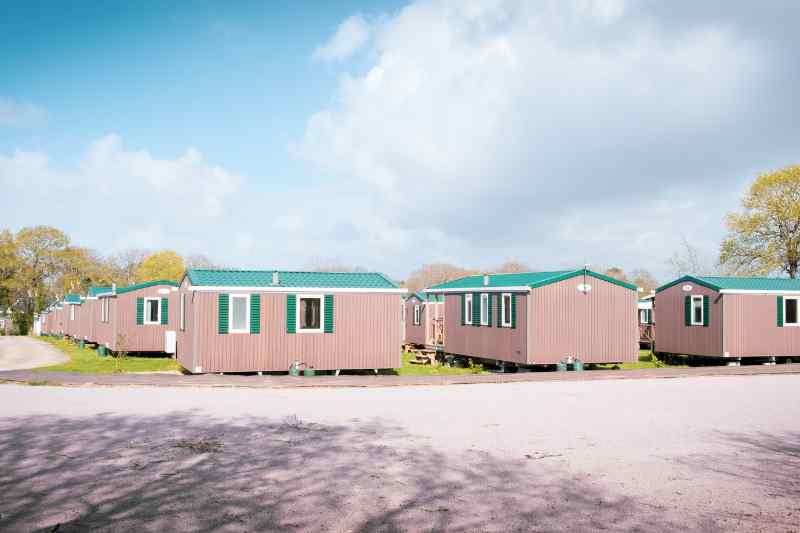
How to buy a mobile home park with no money
The best way to buy a mobile home park with no money is through creative financing.
Creative financing can involve:
- Using equity from an existing property or investment as a down payment.
- Crowdfunding.
- Borrowing money from private lenders.
- Withdrawing some of your retirement funds.
- Forming partnerships with like-minded individuals who have low funds.
Cons of owning a mobile home park investment
While we’ve already extensively reviewed the pros of mobile home park investing, there are a few cons that you should take into consideration.
Potential cons of mobile home park investing include:
- Enforcing rules. Renters in a mobile home park are often held responsible for the maintenance of their lot. This primarily concerns lawn care. It’s up to you as the landlord to make sure that everybody keeps their mobile homes up to code and looking nice.
- Owning the units can be costly. If you do go the route of owning both the park and the individual units, then you’re looking at high maintenance costs. This is especially true in the winter when pipes for individual trailers may freeze.
- Location. Many mobile home parks are not located within cities or metropolitan areas. This results in there being fewer public services available for your residents. This includes public transportation, school, workplaces, and even grocery stores.
Takeaways
- Mobile home park investing involves purchasing/developing and renting out a trailer park.
- The benefits of investing in a mobile home park may include low maintenance, high demand, and multiple tax benefits.
- Potential cons of mobile home park investing include unfavorable locations, the cost of maintenance for individual units, and the burden of enforcing rules and regulations.
